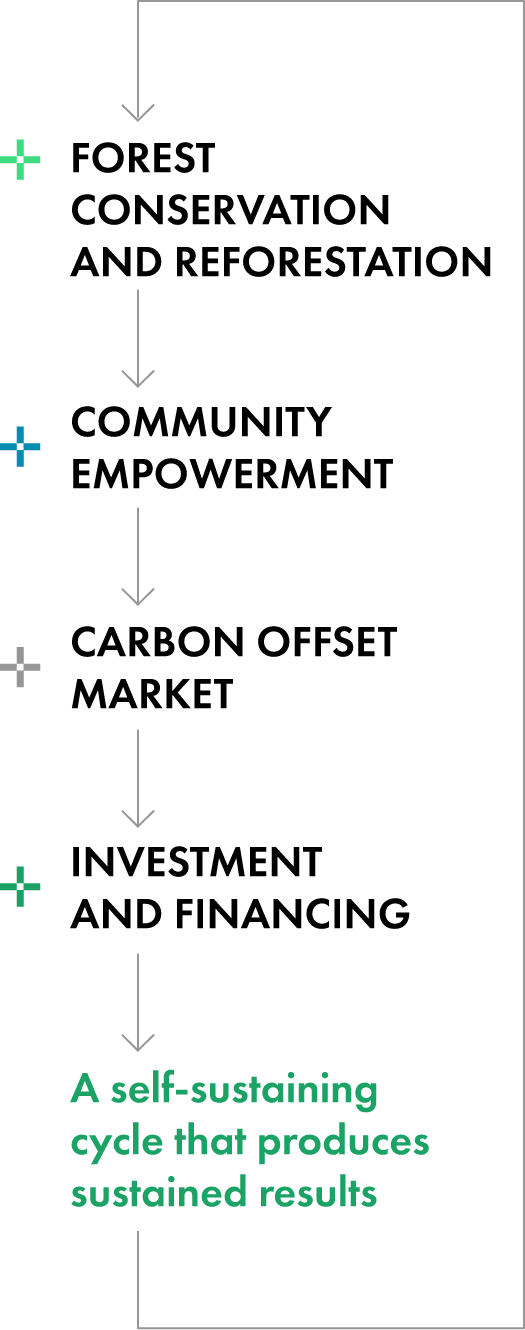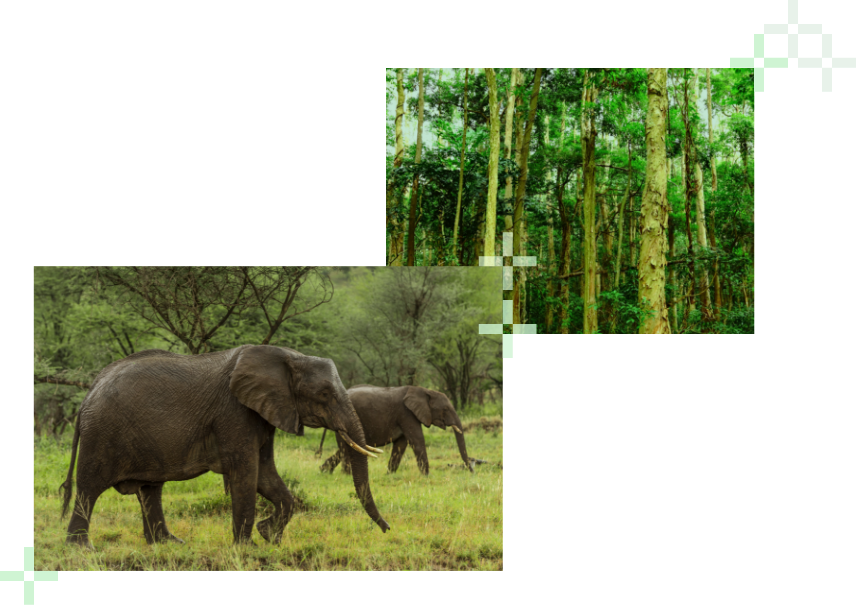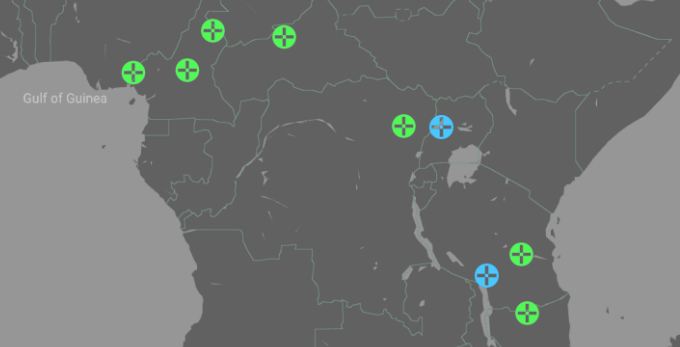




There are numerous fronts in the battle against climate change. One that is often overlooked has been the key to climate balance for millennia—the world’s forests.
REDD+ offers institutions and businesses an impactful and measurable way to fund forest conservation and reforestation projects that are critical to the long-term health of our planet, and our societies and economies.
REDD stands for Reducing Emissions from Deforestation and Forest Degradation. REDD+ is a proven framework for working with governments, local communities, and other stakeholders to protect, preserve, and revive global forest lands.
The REDD Positive initiative is a culmination of decades of forest conservation research and effort. It is backed by the rigorous, scientific approach that is the hallmark of the Wildlife Conservation Society (WCS), one of the world’s oldest and most respected international conservation organizations.
WCS’s forest carbon model is among the most effective, transparent, and accountable ways to fund forest conservation and rehabilitation projects, while offering businesses high-quality, market-tradable, verified carbon offsets.


Keeping global warming within 1.5 degrees Celsius will help us avoid some of the most devastating and high-cost impacts of climate change—including increased intensity and frequency of heatwaves, major storms, wildfires, and droughts.
It’s not too late, but keeping global warming at this level will require accelerated and immediate action, including emission reductions across all business sectors.
Restoring and maintaining the earth’s natural carbon sinks is also essential for meeting global climate goals and commitments.
Forests are an irreplaceable global resource that sustain rich and unique biodiversity, regulate atmosphere and climate, and directly provide livelihoods for more than 1.6 billion people.
Despite their numerous benefits, these vast forest carbon sinks continue to be lost to deforestation and degradation at alarming rates. Deforestation and degradation release stored carbon into the atmosphere and contribute to climate change.
Land use change, in particular the conversion of forests to agricultural land, accounts for between 11 to 25 percent of global CO2 emissions. Protecting natural forests and restoring those lost to development is crucial in maintaining the ability of forests to capture and mitigate human-caused emissions.
Created as a result of the United Nations Framework Convention on Climate Change in 2008, REDD+ is a transparent and accountable protocol for generating market-tradable carbon offsets linked to activities that protect or enhance natural carbon sinks, and the communities and biodiversity that live within and around them.
Conservation projects issue verified carbon units (VCUs) that can be sold via a registry to businesses and governments to offset their carbon emissions. VCUs are generated only once actual positive impact is observed, such as improved forest conditions or a reduction in deforestation rates.
By combining science, finance, and collaboration among national and local actors, REDD+ projects have the potential to deliver meaningful and lasting results for ecosystems, the communities they support, and the global climate.

Carbon offsets are measured using a rigorous, transparent, and peer-reviewed methodology that ensures emission reductions are accurately calculated and verified by a reputable international carbon accreditation program/standard.

Emission reductions and removals are generated and scientifically monitored within a defined landscape or jurisdiction, and verified by an independent third party against a reputable international crediting standard.

National and local governments, land owners, and local communities ensure that projects benefit biodiversity, wildlife, and wild places. They also ensure climate finance revenues are distributed fairly to those who contribute to the project’s success, including Indigenous Peoples and Local Communities (IPLCs).
WCS employs practical, proven strategies developed and refined by our local teams working in landscapes where WCS has a long-term commitment.
WCS considers local communities central to each project, and we defend their ability to benefit from carbon revenue before all other interests. This includes:

Interest and investment in forest restoration projects like REDD+ and the carbon credits they generate are growing rapidly and expected to continue to expand in the next decade.
The value of Voluntary Carbon Market transactions in the first eight months of 2021—73% generated from the forest and land use sector.
Projected annual value of the carbon offset market by 2030.
Since launching in June 2021, the REDD Positive Fund has gained impressive momentum, surpassing expectations and making important progress in the research, planning, staffing, and startup phases of our global REDD+ projects.
in projected carbon revenue over the next 10 years from the Northern Plains, Cambodia project.
identified and targeted for potential REDD+ development.
of forest land in the REDD+ project plan design and development phase.
WCS’s REDD+ strategy is to support governments, Indigenous people, and local communities to receive pay for performance funding for forest conservation. These are the projects that WCS and the REDD Positive Fund support.
 Early
Early
 Advanced
Advanced
 Producing credits
Producing credits
 Early
Early
 Advanced
Advanced
 Produced Credits
Produced Credits



Keo Seima Wildlife Sanctuary (KSWS) protects one of the most important forests in Cambodia.
learn more














in projected carbon revenue over the next 10 years from the Northern Plains, Cambodia project.
identified and targeted for potential REDD+ development.
of forest land in the REDD+ project plan design and development phase.
Contributions to the WCS REDD Positive Fund will enable us to direct resources where they are most needed—advancing early-action REDD+ activities that accelerate the analysis and protection of our most important primal forests and wetlands, bringing projects to the accreditation stage, and selling carbon credits to interested buyers in need.
 Grant Funding
Grant Funding


 Grant Funding
Grant Funding
 Investment
Investment



The WCS REDD Positive Fund was founded in 2021 after many conversations about what innovations would make a difference, and with an initial contribution from Instinet. Ours is an ambitious, but achievable goal: to connect the worlds of business and conservation to combat climate change in rigorous, actionable, and achievable ways. We’ve already begun, but there is still so much more to do.
The WCS REDD Positive Fund will invest charitable funds over multiple years to address the climate crisis through the development of forest conservation and reforestation projects worldwide.
The Wildlife Conservation Society (WCS) is a US nonprofit, tax-exempt, private organization established in 1895 that saves wildlife and wild places by understanding critical issues, crafting science-based solutions, and taking conservation actions that benefit nature and humanity. With more than a century of experience, WCS currently oversees a portfolio of more than 500 conservation projects in Asia, Africa, Latin America, and North America, and the oceans between them. With a presence in more than 60 nations, and experience helping to propose or establish 347 protected areas across the globe, WCS has amassed the biological knowledge, cultural understanding, and well-established partnerships to ensure that vibrant, wild places and wildlife thrive alongside local communities.
Instinet provides technologically advanced, agency-model brokerage services to institutional clients worldwide. As the wholly-owned execution services arm of Nomura Group, Instinet seeks to add value across the investment life cycle, providing: Agency Execution Services; Crossing & Liquidity Aggregation; and Workflow Solutions via Instinet Technology Solutions. We help institutional investors create, protect and capture alpha, reduce complexity, and lower overall trading costs to ultimately improve investment performance. Over the course of our more than 50-year history, Instinet has been a pioneer in electronic trading, creating an array of now industry-standard technologies and services.
Today we understand more than ever that the world is our trading floor. Our work, our people, and the results of our efforts are neither contained nor constrained by the walls of any office building. Everything we do must be guided by the knowledge that we are all connected. Please visit us at www.instinet.com/tradebetter to learn more.